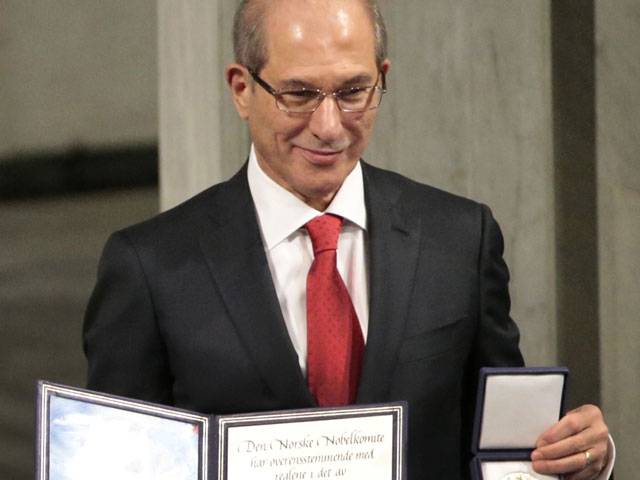OSLO - The body tasked with ridding the world of chemical weapons picked up its Nobel Peace Prize in a ceremony in Oslo Tuesday after saying it hoped the prestige would speed a global ban on the dreaded arms.
Eliminating such weapons is “a noble cause,” the Organisation for the Prohibition of Chemical Weapons (OPCW)’s director general, Ahmet Uzumcu, said Monday. A handful of countries, including Israel, Egypt and North Korea, are not implementing a global ban watched over by the OPCW.
The Hague-based watchdog was thrust from obscurity into the spotlight this year because of its lead role in organising the destruction of Syria’s chemical weapons, whose use nearly propelled the United States into a new Middle East war.
The Norwegian Nobel Committee’s October 11 announcement that the OPCW won the Nobel Peace Prize for its efforts has further elevated its reputation.
The body notably intends to use the eight million Swedish kronor ($1.2 million, 898,000 euros) that comes with the prize in the ceremony Tuesday to establish its own annual award.
“Hopefully in the near future we will be able to do away with a whole category of weapons, chemical weapons,” the chairman of the Norwegian Nobel Committee, Thorbjoern Jagland, said Monday.
The honour bestowed on the OPCW brings it into an elite group of people and organisations seen as having promoted peace in the world - including Nelson Mandela, whose memorial service in South Africa was also held on Tuesday.
Since the global ban on producing and storing chemical weapons came into force in 1997, 190 nations have signed up to the Chemical Weapons Convention administered by the OPCW.
More than 80 percent of declared chemical weapons have been destroyed.
But, as the OPCW itself underlines, the job is not yet complete.
Six states remain outside the convention: Israel and Myanmar have signed the pact but not ratified it, while Angola, Egypt, North Korea and South Sudan have failed to do either.
Uzumcu, a Turkish citizen, said Monday: “I see no reason for any country” not to implement the convention.
“I sincerely hope (the others) will reconsider and join this Chemical Weapons Convention,” he added.
Among convention members, the United States and Russia have both pledged to scrap their chemical weapons, but failed to meet a 2012 deadline to do so.
The OPCW’s reception of its Nobel Peace Prize comes at a time when it faces its most logistically challenging task ever: destroying chemical weapons from Syria, which became a member in October.
Syria’s hasty adherence to the convention averted strikes by US-led forces after a nerve gas attack that killed hundreds on the outskirts of Damascus on August 21.
A roadmap adopted last month by the OPCW to rid Syria of its chemical stockpile says “priority” weapons must be removed from the country by December 31.
Before receiving the award on Tuesday, Uzumcu told AFP that destruction of the weapons could begin in early 2014.
“We hope that by the end of January, the destruction on the American ship could start,” he said.
The Syrian weapons are to be destroyed aboard the US Navy’s MV Cape Ray, a 200-metre (650-foot) cargo ship equipped with two hydrolysis systems.
Hydrolysis involves breaking down a lethal chemical agent such as mustard gas with hot water and other compounds, which results in a sludge equivalent to industrial toxic waste.
But Syria’s chemical arms must first be transported through a war zone to the Mediterranean port of Latakia.
“Much will depend in fact on the security situation and unfortunately the security situation has deteriorated over the past weeks,” Uzumcu said.
“There could be some slight delays but I’m not that worried about delays,” he added.
Wednesday, April 17, 2024
Watchdog hopes Nobel prize will speed up chemical arms ban

Pride and hype as F1 roars back to China after Covid absence
10:36 PM | April 16, 2024
No let-up in Karachi street crime incidents
10:35 PM | April 16, 2024
Stock market today: Most of Wall Street weakens again as Treasury yields rise more
10:34 PM | April 16, 2024
Muslim K-popstar Daud Kim buys land to build mosque in South Korea
10:33 PM | April 16, 2024
Punjab Stadium unavailability derails National Challenge Cup 2023 Final Round
10:28 PM | April 16, 2024
Political Reconciliation
April 16, 2024
Pricing Pressures
April 16, 2024
Western Hypocrisy
April 16, 2024
Policing Reforms
April 15, 2024
Storm Safety
April 15, 2024
Democratic harmony
April 16, 2024
Digital dilemma
April 16, 2024
Classroom crisis
April 16, 2024
Bridging gaps
April 16, 2024
Suicide awareness
April 15, 2024
ePaper - Nawaiwaqt
Advertisement
Nawaiwaqt Group | Copyright © 2024





